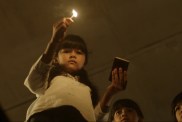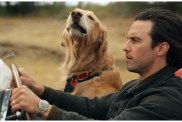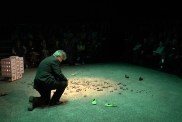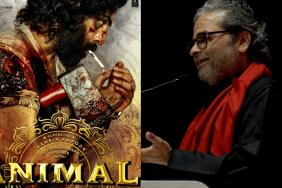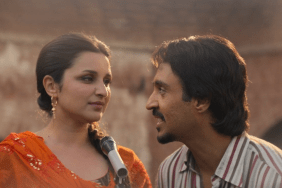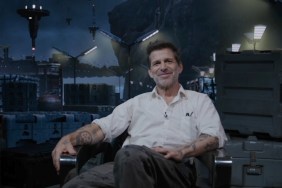26-year-old actor Ryan Gosling’s career continues to be on an upswing even as he continues to take unconventional roles in smaller independent movies after his recent Oscar nomination. His memorable performance in the title role of the sublime dramedy Lars and the Real Girl is no exception, as Gosling gained weight and grew a moustache to look older as a lonely man who always keeps to himself until he purchases a lifelike sex doll and starts introducing her to his worried family and friends as his “new girlfriend Bianca.” Much to everyone’s surprise, she allows Lars to come out of his shell as the entire town embraces Bianca and tries to get her involved in the community. With a great ensemble cast including Emily Mortimer and Patricia Clarkson, it’s a far more intelligent and moving film than some might expect from such a high concept premise, but it never loses sight of the fact that it’s a comedy, and it’s just as likely to have you laughing as it is to draw a tear or two.
After the film debuted at the Toronto International Film Festival to rave reviews, Gosling has been doing the interview rounds and ComingSoon.net caught up with him in New York City.
ComingSoon.net: Did you look at this movie as an opportunity to give another acting tour de force?
Ryan Gosling: (laughs) No, I thought it was terrifying. I thought a guaranteed failure, for sure on my part you know? It’s such a tricky role, but I loved the script. To be honest, when I first read it, I thought this was a movie about a guy and a sex doll and it’s never going to hold up for the whole film, and I was crying at the end of the script and I thought, “Who is this woman? This writer, Nancy Oliver that got me to this place?” I couldn’t have imagined it. It reminded me of “Harvey” it’s one of my favorite films, it reminded me of “Being There,” “Harold and Maude,” a little of “The Velveteen Rabbit.” It just reminded me of all these things that for some reason, they’re like movies that are genres into themselves. There just aren’t many of them, and I don’t know why. We all love them, but yet they just appear every now and again.
CS: Would you call this movie a fable?
Gosling: I think it has fable-type elements for sure, like an adult children’s book or something.
CS: In the movie, the people around Lars go along with Bianca, because they care about Lars and they’re willing to believe in her.
Gosling: I think they do it for themselves, too. I don’t think that they do it just for Lars. I say that because I saw her effect on myself and on everybody in the crew and on the cast. She’s interesting. She asks you to look at yourself, and she forces you to be creative and to develop a relationship with yourself that you haven’t developed. She really forces you to be intimate with yourself, so everybody gets something out of their relationship with her, so I think maybe initially the idea is, “Oh, this will be a conduit to understanding Lars, but eventually it becomes a conduit to understanding yourself.”
CS: Can you talk about acting opposite Bianca? Did Nancy have any kind of lines in parentheses written for her so you knew what the conversations were like? How did you get something out of her like you would normally get from an actor or actress you’re working with?
Gosling: Well, that’s the great thing about Nancy Oliver. One of the amazing things about her script is that she somehow managed to write an incredibly detailed script that mapped everything out. It was very carefully orchestrated yet at the same time it leaves so much room for you to personalize it. There was nothing about how Lars should look, there was nothing about what their relationship was like. It says “they fight”, but it doesn’t say what they fight about, so all of that’s left up to you.
CS: The story is that you read the script Friday and signed on to do it on Monday. Is that normal for you and how did you take what was written on the page to a different place?
Gosling: Well, it was a big deal to meet Craig, the director. I said to him, “How are you going to do this?” For me it was a perfect script, but you could only ruin it, because as an experience of reading it, she does become real to you because you’re reading it. As the relationship with her becomes more complicated then people in the town start to develop their own relationships with her, it’s in your imagination at that point and she starts to become real to you. When you watch it as a film, it’s a doll, and she never becomes real. I remember seeing that for the first time and I remember going, “Oh no, she’s never going to get real, is she? She’s going to always going to stay like that.” It’s a totally different experience reading the script than it is watching the film. I think that they’re both interesting in their own right. I said to Craig, “How are you going to shoot her?” and he said, “I’m going to treat her as if she’s got a nudity clause in her contract.” And he meant it. And he did that. He required that everybody on the set treat her like an actress. She got magazines in between takes, she had her own trailer, they changed her in a trailer, and when she came on set, she was treated like any other actor.

CS: Do you think by neutering the sexuality from the doll is what really makes this work? That it retains this kind of this innocent childlike thing by not having him having sex with her?
Gosling: I think it does. I think it would turn people off to the film, sure. At the same time, I don’t think their relationship isn’t going there. I think one of the things that Craig and I talked about is that one of the things they’re always fighting about is that she wants to be physical and he’s not ready.
CS: Is Bianca an ideal woman?
Gosling: (Laughs) She’s an ideal co-star, I’ll tell you that. No, of course not. It’s a narcissistic endeavor ultimately ’cause you’re having a relationship with yourself. Then, it’s like the first time you fall in love anyway, you’re kind of acting out your own ideas of what love is, that has not much to do with the person that you’re with. I think that in that way the movie is interesting because when you fall in love for the first time, I mean I speak for myself, but you’re always posturing, you’re kind of playing out a role of a lover and you’re just acting it out on somebody and I think that this is kind of a neat representation of that.
CS: Can you talk about how your character evolved from the script?
Gosling: What happens is you think you have all these great ideas and none of them are good in the end of the day and why you’re pursuing all of those ideas, these other things subconsciously happen. That’s just the way it works for me. I think I could try and rationalize all of those mannerisms for instance all the blinking, because we sort of felt like
it seems like Lars was watching the movie of his life and he wasn’t actually in it. He was watching it and then every once in a while he’d have to be present and say something or do something. He’d have to be back in his body, but he wasn’t in his body. So, those things just kind of came out, it wasn’t a conscience choice to do it. This was happening, and what’s great about it again, working with Craig, is that in most movies, those things happen, it’s not blinking, it’s whatever it is, but that with Craig
with those directors they think it’s annoying, or it’s distracting, and so you try not to do it because it irritates them like, “Oh, you know you’re blinking a lot,” so now you’re more conscience of this thing that you’re doing than being in the scene. Craig’s great because he says, “Okay, that’s the character, we’ll just leave it in the movie. Let’s do it.”
CS: We’ve heard stories about you sleeping in the garage and growing the moustache? Did you get an image just reading the script of how you saw him or did you start experimenting?
Gosling: That stuff just comes from a million different places. You know, I had a beard and so I shaved it and I caught a look in the mirror before I shaved the rest and I saw him looking back at me, that’s all, so I said, “He’s got a moustache.” I didn’t know that. It just hit me when I saw it. Things like staying in the garage. I’m embarrassed to talk about it because it’s kind of desperate you know, but you do whatever you can do to try and understand the character because they’re paying you and you feel like you should be doing something. Mostly, that stuff doesn’t work. I don’t think that helped me at all. When I did “Lars,” for the first week no one would talk to me and I couldn’t understand why. I thought everyone was really rude and I asked my driver one day after a week and I said, “Hey man, you’re a really rude guy, to be honest, because I’ve been talking to you for a week and you haven’t said a word to me. It’s not nice.” He said, “Oh, I was told not to talk to you. I heard you were real method and you’ve got to be called ‘Lars,’ and we can’t look you in the eyes and stuff.” I just thought, “Man, I don’t know how this impression of me got out there like I’m some method actor. I’m not trained, I’m not method, that’s not how I am. Things like staying in the garage make me seem like I’m super-serious about it or something. I’m just trying to do my job.
CS: Did you gain weight for the role as well?
Gosling: Yeah, but for me I don’t think that that’s method as much as like, I got hired to do a job, so I’m just doing my job. I just felt like I needed to get out of my own
I’m a guy that in my life mostly for roles have to like work out and do stuff like that. My body is not the body of a guy who’s just sat in the garage his whole life. It’s mostly for work. I probably would be if I wasn’t an actor, but I had to kind of with this role, I had to strip myself of all my ideas of what of this persona that I have built for myself of what I think is charming or what I think is sexy or what I think is interesting. Lars isn’t aware of any of those things, he not self aware in that way. I had to take all of that down and just strip myself bare.
CS: Doing this stuff for the job, does that make it harder as an actor to do more work because you’re spending so much time preparing? I heard you moved into a small apartment for a couple months for “Half Nelson” as well.
Gosling: Yeah, you spend time, but acting is so
it’s not hard. So in a way you have to feel like you’re working, like you’re doing something, otherwise you’re just showing up and saying lines and it’s hard to feel okay about that.

CS: Director Craig Gillespie mentioned that you decided to start singing that song to Bianca on your own. Can you talk about that?
Gosling: Well, I don’t know. I mean it comes from working with a guy like Craig who’s open to that stuff. For the most part when I do a movie, you say to a director, “Hey! I’ve got an idea” and they get a deer in the headlights look and they go, “Oh no, he’s got an idea. How do I not do it and still make him think that this is a collaboration.” I’m used to fighting on every movie I get. I mean you would be amazed at the stuff you have to fight with to get in. I mean just the littlest thing, it doesn’t even matter like the way you hold something or the way you walk or anything. It’s not in the script or how somebody pictured it, you can’t do it. Then I work with a guy like Craig and he’s totally open. I come up to him and I say, “Hey, how about I sing a duet with myself. I do the male and female parts.” “Okay, let’s do it.” “It’s going to cost a lot of money for the song.” He’s like, “Whatever, if it works, it works.” It’s a dream.
CS: How does Bianca help him cross into the maturity in a way that he wasn’t able to do beforehand?
Gosling: I think that he makes a choice to love and what he does, I think is very brave because it’s a really terrifying thing to do, to be so introverted, to be so afraid of what people think of you and what you think of yourself, and then to kind of do this thing that you know everyone is going to judge you for, but do it because you know it’s what you need. This is something that he knows he needs to do, so he does it.
CS: Even though there is something dysfunctional about the relationship on the face of it.
Gosling: Well, you know, that’s your opinion. To me, I think that’s it’s no different than a teddy bear. I wouldn’t say a guy’s or a kid’s relationship is dysfunctional with a teddy bear, and Lars is a kid. There’s a kid in all of us. Just because he’s in a body of a man doesn’t mean
he’s just really in touch with that side of himself. He’s not moved on, and for him he never had that, so for him he has this real deep connection to this object like we’re all capable of it.
CS: How do you see the connection between “Lars” and “Harold and Maude” since Bianca is very different from the female character in that movie?
Gosling: Well I don’t think that it’s similar in the storyline. I just think it’s similar in the sense that there is something about “Harold and Maude,” something about “Being There,” something about Gene Wilder as a performer, that they all break your heart and make you laugh at the exact same time.
CS: Like the Gene Wilder in “Young Frankenstein”?
Gosling: Yeah sure, Gene Wilder in everything. He’s my Marlon Brando. I think he’s one of the greatest actors of all time, because he gives you everything at once. Some actors they give you the serious or they give you the scary, some guys give you the funny, some guys give you the sad, some guys give you the pathos, you know whatever it is, but they give you the one thing for the most part and they do it great, and he does everything. He gives it to you all at once and lets you figure it out. You think it’s funny, you think it’s sad, I dunno, it’s up to you.
CS: Is there one particular film or performance of his that you think stands out?
Gosling: I think Willy Wonka is probably one of the greatest performances of all time. That’s one of the most multi-layered characters I’ve ever seen. See he’s terrifying in some scenes then he’s completely
.
CS: How old were you when you saw Willy Wonka?
Gosling: I don’t remember.
CS: Did you bring anything from your background as a Mormon into this role?
Gosling: I was never really a Mormon, my parents were, but my mom’s really cool, and she always said, “This is an option, it’s not the only option, you need to figure it out for yourself.” She never really pushed any of that stuff onto us and I never really could identify with it. You know there’s good things about going to church and it socializes you when you’re young. You got to shake hands and talk in public and things like that, sing in church.
CS: Did making this movie remind you at all of the place where you grew up?
Gosling: It did, a lot. It’s a little nicer than where I grew up, but the people there were kind of similar.
CS: You’ve been doing a lot of smaller movies recently, so do you have any desire to do a big budget blockbuster?
Gosling: I’m doing “The Lovely Bones” with Peter Jackson so there are special effects in there. It’s a film about a family.

CS: Are you the killer or the father?
Gosling: Yeah, the father. They wanted him to be young. Peter and his team kind of had this idea that they want them to be really young parents and they had their daughter when they were just like in high school.
CS: What did the Academy Award nomination do for you? Do you feel it changed your status and help in terms of getting movies like this one made?
Gosling: To those who value what that means, it does. To those who don’t it doesn’t and it is whatever you want to make of it. For me, it honored my family and all the people who put a lot of hard work into where I am. I work with a lot of people who put themselves into and totally get behind what I’m trying to do, and I couldn’t do it without them and so you honor them by honoring me. For me, awards are for your Mom anyway, and my mom was thrilled so I was happy.
CS: You worked in large studio movies and independent projects, so how have the differences between the two helped or hurt your work?
Gosling: I think that it depends on how you look at it. I feel like all of those experiences have helped me. I think studio movies, you have less freedom on them. There’s no way around it. They’re putting a lot of money into something and they need to make it back, so if you do something, anything really that’s not right down the middle, it might alienate somebody. In that case, you can’t do it because you have to appeal to the biggest audience. In some ways, it’s kind of hard to work for studios. At the same time, you want people to see your movies too and so studios they get them into the theatres, the films into theatres, that they just can’t get small movies into. There’s a benefit to doing them as well. Independent films, they can be painful because everyone puts so much work into them and you just can’t get them to the people, you know? If you could get them to the people
let the people decide is my feeling. Get it into all the theatres and you just let them decide what they want to see, but it’s all these people making choices for you thinking, “Oh, only people in New York are only going to like this movie.” It’s insulting.
That said, Lars and the Real Girl is now playing in (you guessed it) New York and Los Angeles, but hopefully, it will open in other select cities soon. Also check out our interview with director Craig Gillespie.
